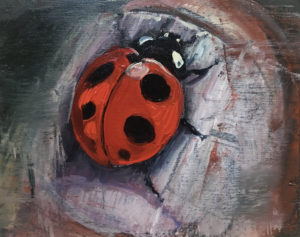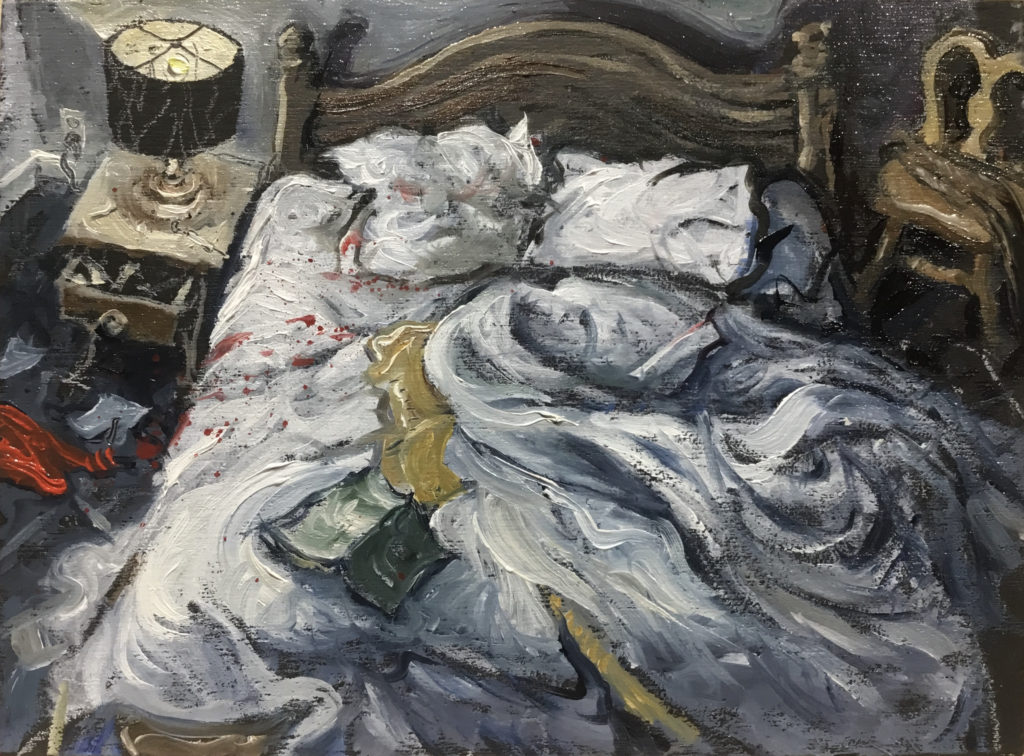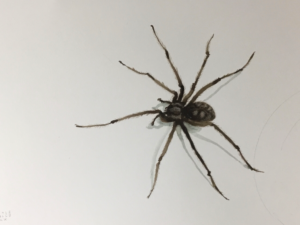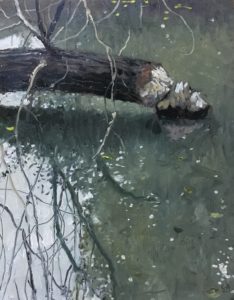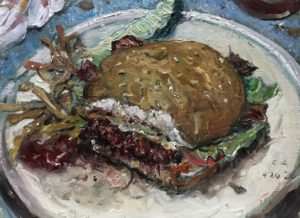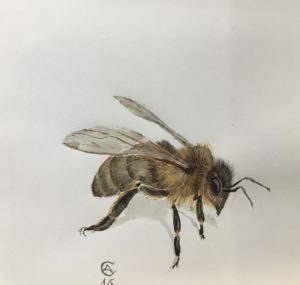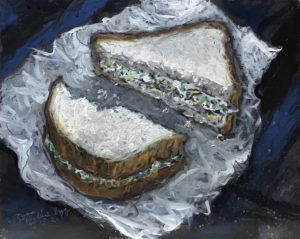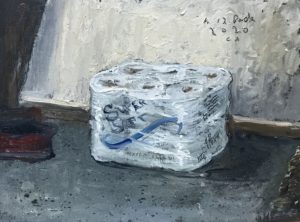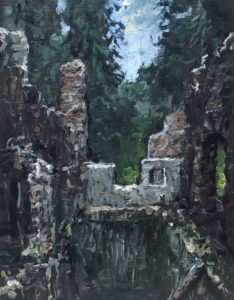BLACK LAMBS
She shouldn’t have told Charlie in the first place. Why did she? You sleep with somebody and suddenly you’re soul mates, ready to reveal the darkest secrets of your life? Now Charlie won’t let her drive to the city alone. She tries to convince him that she’ll be fine, that it is really no big deal, but he insists it isn’t safe for her to walk around the Tenderloin alone.
“I’m not going to walk around. I’ll drive to the block Vince said, open the window when I spot him, and hand him the money.”
“It might not happen like that,” Charlie says. “And what are you worried about, that Vince will see us together and jump to conclusions? As far as he’s concerned, I’m just your escort.”
“Some escort,” she says, and kisses him on the forehead. No need to spoil the sweetness between them so soon.
“Give me fifteen minutes,” Charlie says, enthused for the adventure. “I’ve got to go back to my place, take a quick shower, and put out some feed for Roscoe.”
Pina thinks of driving off before Charlie returns. This should be between Vince and her. How many ways can she betray him? Her guilt is really barking at her. She didn’t have to tell Charlie about this, but it wasn’t an accident.
Before she’s got herself fully dressed, Charlie’s at the door with a cooler and a sack full of homemade facemasks. “I made us sandwiches,” he says, “and one for Vince.”
Great, she thinks, we’ll have a little picnic in the Tenderloin.
Pina insists on driving and stops at a cash machine on the square. For a while they manage to talk about everything except their mission. Charlie has a lot to say about one of Trump’s pet projects: Space Force. The new Space Force flag was unveiled yesterday in the Oval Office. “They just went and stole the logo from Star Trek,” he says, “and then Trump calls this rocket they’re pretending to develop, a ‘super-duper missile,’ which somebody pointed out later on Twitter, was the name of a porn star in the eighties.”
“Anything to distract us from his murderous negligence and misinformation.” Pina doesn’t want to wade any further into her anger toward Trump, but maybe she should change her strategy. Vince’s description of the heroin consolidation plan comes to mind. It allows you to roll your problems into one—staying high. She might do well to combine her grievances into single-minded hatred toward Trump, except that such sustained animus would likely make her ill.
Charlie does a hemiola bongo riff—two beats against three—with his hands on the dashboard, and she wonders if, despite his good cheer, he’s a little nervous about their adventure.
He raises his index finger, altering the beats. “Heard this town hall with Joe Biden and Stacy Abrams the other night. He says he’s not going to pardon Trump.”
“Normally I’m against capital punishment, but I’d enjoy seeing that man lynched.”
Charlie’s head jerks back and his hands come off the dash. Apparently, she’s shocked him. “Would you participate in the lynching, Pina, or just be a spectator?”
She doesn’t want to go there, doesn’t want to let Charlie know what horrid thoughts she’s capable of. “I can’t think about Trump anymore. He gets into your head and you’re infected with another virus.”
They drive in silence for a while and she tries to focus on the task at hand. Will it go as she hopes, simply find Vince and hand over the dough? Or do they try some kind of intervention? How would that look? Is such an intercession even possible with a man who’s likely infected, in a time when back-up services are unavailable?
“So how long do you think the freeways will be empty like this?” Charlie asks.
She doesn’t want to make small talk. This is one reason she wanted to drive alone—single-mindedness is required.
Charlie drops a hand on her thigh and squeezes it. “Are you okay, Pina?”
No, she’s not okay at all, but she wants to talk even less about herself than this and that. “Yeah, I’m fine, but in response to your earlier question, I think it’s going to be a very long time, if ever, before the traffic becomes as it was. How many people are going to return to office buildings in San Francisco? All these giant tech companies are telling their workers that they never have to come back to the office, and without those workers present all the restaurants and services that depend on them will fold.”
“Do you think people will leave the city en masse?”
Pina thinks of the character in the Hemingway story that says, “Will you please please please please stop talking?”
Charlie answers his own question: “I mean, it’s like somebody said, ‘Why pay San Francisco rents when it’s not San Francisco out there anymore?’ The office buildings may be half empty.” His hands throb in the air for emphasis. “And tens of thousands of people won’t be able to make the rent.”
“Homelessness will be rampant,” she chips in. “The city will take on the flavor or, should I say, redolence, of Mumbai during a heat wave.” So she and Charlie are having a delightful moment of dystopian sharing. She wouldn’t have thought him capable of such darkness.
“Yep.” Charlie goes back to his two against three beat rhythms on the dashboard. “Anybody with money who stays will have to hire guards to protect them from the huddled masses.”
“Soylent Green is people,” she says, just to add another accent to the dark stew they’re prepping.
Charlie backs off the bongos and glances at her with a wary look. There’s something about his expression that reminds her of a teenage boy, somebody she vaguely remembers from high school—Jason, a boy she briefly went out with. The moment she broke-up with him his face puckered in sadness. Charlie’s expression is similar but he’s wearing his grief for a different reason.
“Do you really believe all that’s going to happen, Pina?”
She does, and she would gladly go on with the bleak recital, but thinks it better to offer Charlie some comfort. “I do think some of that will happen, but on the flip side, there may be opportunities to rebuild the city in a more equitable way. Young people will move in and reinvigorate the place with much greater diversity. Finally, they’ll be able to afford to live in the city.”
By the time they reach the bridge, they’re both quiet. Not even the gloom can erase the majesty of the Golden Gate. Years ago in school she worked with a girl, maybe seven or eight, who had a bad stutter. This girl always liked to talk about heaven. Maybe she came from a religious family. One day Pina asked her what heaven was like. Aside from the stutter, her response was quick: “Hev . . . hev . . . heaven is li . . . is like the Golden Gate Bridge.” She pronounced the balance of the sentence in one fell swoop. Pina repeated it: “Heaven is like the Golden Gate Bridge,” and the girl said the sentence perfectly. It may have been the first time in her life that she spoke without a stammer.
Pina speeds through the Presidio tunnel toward the Marina. How she would like to dally here, take a walk with Charlie along the beach at Crissy Field or past the sailboats and fishing crafts moored in the Marina. How nice it would be to drive to North Beach, where today she’d probably find a parking place. A creeping gauze of nostalgia drapes over her. She’d like to eat at one of the old family-style restaurants she used to visit with her parents, more than forty years ago: The New Pisa, The Green Valley, The Golden Spike. All of them, like her parents, long gone.
She turns away from the Marina, and heads south on Divisidero. Two blocks up, she pulls over. “Charlie, I need you to sit in the back seat. From now on you and me are not Covid bonded.”
“Got it,” he says, “I’m nothing more than your escort.” He shifts quickly to the back seat and she smiles at him in the rearview mirror.
The city sparkles, after the morning rain—a rare mid-May rain that gives the air a crisp brightness. Even the old white apartment buildings look like they have been blessed.
She turns left on Bush and her nerves flare; a knot forms in her stomach. What will Vince look like? Will she even recognize him? What will he say when he sees Charlie?
Right on Hyde, she braces herself. A few blocks south, and the scattered homeless take over the landscape. All the work the city’s been doing to try and house them is either a fiction or ineffective. Her mind struggles to synthesize what she sees, a universe of smashed leavings: broken crutches, filthy tarps, a shopping cart missing a wheel, a picket sign leaning against a wall that says, Living wages, another shopping cart filled with smashed cans, stacks of cardboard, newspapers a flutter, a row of upturned milk crates, broken bottles, a length of hose coiled around a lamp pole.
Finally, she lets herself see the people: a woman with sores around her mouth, marching back and forth in front of an empty storefront, a man sitting on a crate, smoking, another eating a chicken leg that looks to have no meat left on it, someone coiled under a disgusting blanket, sleeping directly on the sidewalk, two young guys spending their extended adolescence on the street, playing with a rabid-looking dog, a cowboy bandana draped around its neck, a stout Latina in a nurse’s uniform, the only person she’s seen yet wearing a mask.
She wants to turn left on Ellis, but it’s a one-way she can’t enter, so she goes down to Eddy, glancing back at her escort in the mirror. His expression is as grim as she’s seen it. “He could be anywhere around her, Charlie. I’m circling back to Ellis, this is Leavenworth.”
“Roger. I’ll look right, you look left.”
She passes The Black Cat, a swanky bar with a jazz room downstairs that she and Vince frequented a couple of times. There’s a crooked line outside of a bánh mi shop, as she turns west onto Ellis, but Vince isn’t waiting for a sandwich. Social distancing doesn’t seem to be a thing here; small clusters of people talk together. She drives so slowly that she’s drawn the attention of some of the folks on the sidewalk.
“Haven’t seen him yet,” Charlie reports.
A car behind her, that seems like it’s come from out of nowhere, starts honking. Now more eyes from the sidewalk are turned to her.
“You better pull over.”
“Why’s everybody staring at us?”
“They think we’re cops.”
“Really, do we look like cops?”
“Turn the corner and pull over.”
She doesn’t know how she feels about Charlie giving orders. There’s another car honking behind her, but before she gets to the corner a very skinny man in a Giants’ cap tosses something at the car that actually shakes it.
“What the fuck was that?”
“I don’t know, a hunk of concrete? Come on, turn the corner, Pina.”
She turns back down Hyde and double parks in front of a Chinese laundry called Alice’s, with a window filled with thriving succulents. The knot in her stomach is now throbbing. She gets out of the car and Charlie follows her. The big boulder, or whatever it was the guy tossed, carved a good-sized crater into the passenger door. Charlie comes close to have a look. “Social distance,” she barks, and then softens, “Sorry.”
Charlie backs away from her. “You stay here and I’ll find him.”
“No, I’ll go.”
Charlie doesn’t look amused. “I’m not going to let you go alone, Pina. Let’s park the car now.” He climbs into the back seat.
Pina pulls out without looking and almost gets clipped by a grocery truck that just turned onto Hyde. She finds a questionable spot, half in the red, on Eddy. “Oh, my nerves are shot.”
“You stay here, Pina.”
She takes a long breath. “We both go.”
Charlie walks ahead and she pretends to stay six feet behind him. They head up Jones past Jonell’s Cocktail Lounge, a true dive bar that Vince took her to once. That was the kind of adventure he enjoyed in their early days together. Once he discovered that she would drink anywhere, he brought her to many of his old watering spots.
As they turn onto Ellis, a man with a Jamaican accent, leaning against a wall between storefronts, speaks to Charlie: “Wha gwan, professa. A lil hep fi a man tween opportunities.”
She inches closer to Charlie, surprised to see him reach into his pocket and hand the guy a five dollar bill.”
“Tanks for da cheddar, professa. Remine me zacly wha yu be a professa o.”
“Magic,” Charlie says, without hesitation.
“Professa o magic. Ha ha ha. Dat’s shot. Yu gots a lit mo magic fi me?”
Charlie shakes his head.
“Yu cool, professa.”
“I have something else for you.” Charlie reaches into his shoulder bag and hands over a large plastic bag with a mask in it. “It’s clean.”
“Dat’s shot, professa. The Jamaican pulls out the mask, which is zebra-striped and tries it on.
As Charlie moves along, the man addresses her, “Sistern, yu wid di professa?”
She shakes her head.
“Thot yu was. Priddy sistern, yu god a liddle cash for my rash?”
“Not today,” she says and hurries along.
“K. Yu catch Professa Magic, cum back marow.”
There are more people than she expected on the street, some under blankets and others, a bit like ghosts, camouflaged amid the gray storefronts and cardboard castles. There are also folks, who live or work in the neighborhood, numerous Vietnamese, even mothers with children, going about their business as if this tragic tableau was normal, as it is for those who live here.
Pina falls a ways behind Charlie, allowing more than ample distance between them. She’s a little bit surprised that he doesn’t turn back to make sure she’s behind him. Clearly, he has more faith than Orpheus did. She walks quickly past the skinny guy in the Giants cap that tossed the boulder at the car, but before she gets far she hears a laughing female voice shout: “That’s the woman, that’s the woman just sitting there in her car.”
She looks right and left for Vince and three quarters of the way up the block, past two men playing checkers on a cardboard box turned on end, she gets her first glimpse of him. He’s standing up, his wide shoulders tilted to the side, speaking with Charlie. She feels both a rush of joy that he’s alive and horror that he’s standing out here ravaged. How could a man degenerate so quickly?
As she creeps closer she sees that the left side of Vince’s face has a raw bruise, and his lower lip is cut. He’s wearing a torn flannel shirt over blue scrubs, and a pair of brogues with no socks. She stands back by the curb. That’s as close as she’s going to get. “Vince,” she says, “I’m so glad we found you.”
“This is where I told you.” He glances from one of them to the other. “So when did you two become an item?”
Charlie begins to explain, “No I just came down . . .”
“Like I give a damn. You got the money?”
“Yeah, we have the money.”
“Cat’s got Pina’s tongue. Go buy her a drink, Charlie. She needs a drink. Now give me the money.”
“You’re not looking so good, Vince.”
“Well the beauty contest was last week.”
It’s true, she’s lost her tongue and she feels that if she opens her mouth she’ll stutter like one of her clients. She’d like to run and just keep running. Somehow she’s lost all her agency. She thought she could rise to the occasion. It’s all she can do to stand here and not to pee herself.
Charlie is holding his ground. “I’m going to get you to the hospital, Vince.”
“Who do you think you are, Charlie, the adult in the room?”
It ‘s a funny comment because that’s exactly who Charlie is acting like. She’d laugh if she weren’t drenched in shame, for what? Having lost her voice? Betraying Vince, not so much with Charlie, but as a mate, somewhere along the line. Surely she has some responsibility for the fact that he’s come to this.
“Give me the money,” Vince hollers.
Charlie reaches into his shoulder bag and pulls out a pair of purple gloves that he slips on. “Okay, I have a mask for you and I want you to put it on.”
“What the fuck?” Vince takes the bagged mask and tosses it on the ground.
“Pick it up and put it on, Vince.”
Vince slumps and sways back and forth a moment. His eyes are rheumy and he looks like he might collapse.
Charlie picks up the mask and ties it around Vince, who mumbles something unintelligible. “Lean against the wall, Vince. Now I can either call an ambulance or take you myself.”
“I’m not going in an ambulance,” Vince says, his words slurred.
“Okay, it’s settled, you’re coming with me. We’re parked two blocks away. Can you walk that far?”
“Give me my money,” Vince says weakly
“You’ll get your money. Can you walk two blocks?”
Vince nods.
Charlie turns and faces her. She’s never seen this side of him, so assertive and clear, and now he offers her a kind smile. She’s amazed that in one breath Charlie is able to be both forceful and tender. “It’s going to be okay, Pina.” He points east. “I want you to walk over to Union Square and wait for me there. I’m going to drop Vince off at UC Med on Sutter and come back for you.”
Pina nods. “Take care of yourself, Vince,” she manages.
His face is bowed now in his fresh polka dot mask. He’s not showing his eyes. “Yeah, thanks.”
Charlie is back in less than an hour. The two of them take a walk on the streets around the square looking at the huge department stores: Macy’s Nordstrom’s, Neiman Marcus, Saks Fifth Avenue, artifacts from a lost world. Charlie takes her hand in front of Neiman Marcus and explains what happened. They checked Vince into the emergency after Charlie told them three things: that he’s a doctor, recently on the front line, who practically od’d in the Tenderloin, and ended up with a concussion. They wouldn’t let Charlie in, but somebody will call. He left a hundred dollars for them to give to Vince.
Pina stops walking in front of Neiman Marcus’s rustic spring window. It’s without the fresh flowers that must have been there before the closure. She faces Charlie. “What did Vince say on the ride to the hospital?”
“Not much.”
“He must have said something.” She can tell Charlie’s holding back.
He massages his chin between his thumb and forefinger. “He said he cracked nearly two months ago, not long after you came to Sonoma. He freaked out at the hospital and started going crazy with drugs. First with pharmaceuticals, and then . . . The thing, he said, that bothered him most was how he let you down.”
“He said that?”
Charlie nods.
She’s not going to let herself cry. “Did he say anything about you and me?”
“No.”
“What did you say to him?”
“I just listened.”
Before they walk to the car they grab a bench in the square and eat their ham and Swiss sandwiches. Again Charlie asks her if she is okay.
“No, I’m still in a state of shock seeing him like that.”
Charlie puts a hand on hers but says nothing.
At the car, he asks if she’d like him to drive. But no, she wants to drive. They sit together in front seat and he gives her just what she wants: silence. Just after the turn at Sears Point, in the long pasture across from the racetrack, cities of sheep with their lambs are grazing. She’d seen them on the way down. Now she pulls into a turnout.
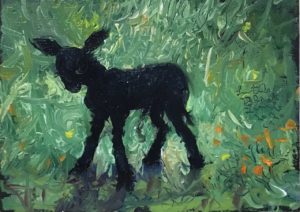
“What are you doing, Pina?”
“I just want to have a look at these sheep.” She gets out of the car and walks fifty yards to a ridge with a good view of the pasture. There are hundreds of creatures down there, mowing the fields after the unseasonably late rain.
Charlie has come out and stands a short distance from her. Vince and the city seem so far away. Not really. She’s just screening off that tableau for a moment.
“Charlie,” she asks, “How does the arrangement work between the sheep keepers and the landowners? Who pays?”
He’s beside her now and drapes an arm over her shoulder. It is still an amazement, this touching another human being.
“The landowner pays, in this case Sears Point. And the people who bring out the sheep have their own fencing and usually a couple of sheep dogs, trained to discourage coyotes. The other benefit to the landowner is that sheep fertilize the land.”
“Oh, I was hoping it was just a neighborly arrangement.” She wraps her arm around Charlie’s waist and pulls him close. Sweetness. She could call him that. They stay a moment and gaze at the civilization of sheep. She’s trying to notice all the different types, if they are even types, and then she sees them. “Look, Charlie.” She’s pointing. “Black lambs. There are three, no, four black lambs down there. I didn’t see them at all and now I’m seeing all of them. I’ve never thought of black sheep in multiples nor have I been aware of black lambs. Black lambs. I guess it stands to reason that black sheep come from somewhere. I find it a real comfort that there’s more than one.”
“A secret society.”
“A proper black sheep doesn’t care much for society.”
“How long have you considered yourself one, Pina?”
“Hmm. All I can say is that even though I’m not young anymore, I find myself identifying with the black lambs.”

